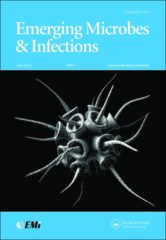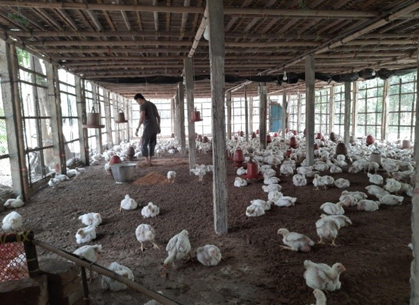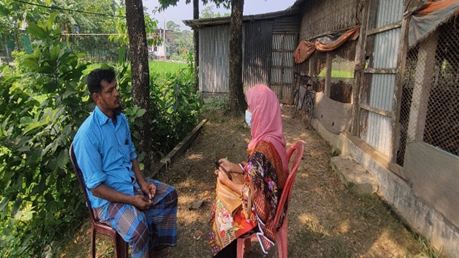
Helping farms become healthier places
Published on 06/10/2022

 This blog focuses on the ZOODLE word ‘FARMS’.
This blog focuses on the ZOODLE word ‘FARMS’.
Zoonoses are infectious diseases transmitted between species – from animals to humans or from humans to animals. Zoonotic pathogens can spread to people through any contact point with domestic or wild animals. But it is as a result of our very close relationship with animals in agriculture that farms represent a major public health risk for the spread of zoonoses around the world.
Three common enteric (intestinal) zoonotic pathogens are found on farms. They include Salmonella, Campylobacter and E. coli – and all can be transmitted by poultry. Yet most poultry farmers in Bangladesh do not maintain proper biosecurity management. Although they know the basics of biosecurity, they rarely fully realise the importance of strict biosecurity. Knowing and realising can be very different. In addition, poverty and illiteracy is a hindrance to practising good biosecurity.
Pathogen spillover
As a result, poor hand washing, a lack of footbaths and personal protective equipment, and proximity to wild animals such as rats, wandering dogs and wild birds around farms exacerbate the risk of pathogen spillover. People working in direct contact with animals on farms are at the greatest risk of zoonotic disease from farms, and as people in Bangladesh live very close to their domestic livestock they are at particular risk.
The enteric zoonoses that spread on farms though present not only a risk to farm workers. They are also a risk to others. For example, the practice of slaughtering and selling animals who fall sick on farms is not uncommon, resulting in disease risk for the slaughters and traders of these infected animals – and ultimately for the consumers who eat the infected poultry products.
Certain avian influenza viruses (H5N1 and H7N9) can also be transmitted from infected birds to humans and are of great public health concern – not least because avian influenza has pandemic potential. Workers who feed poultry, clean equipment, clear poultry waste away and handle sick animals are at greatest risk of getting highly pathogenic avian influenza (H5N1) infection, though overall the risk remains low at present.
Antimicrobial resistance
Farms also present an associated risk of antimicrobial resistance (AMR) spread. As well as for therapeutic reasons, antimicrobials are often used for growth promotion and disease prevention in farmed poultry in Bangladesh. This practice often takes place in low-income countries for what are often quite rational reasons from farmers’ perspectives. However, such misuse of antimicrobials promotes the evolution of AMR in zoonotic pathogens.
As some farmers use their old poultry litter (a mixture of poultry waste and old feathers, food and bedding) on their agricultural land, there is a consequent risk of contamination of agricultural produce as the litter can carry zoonotic pathogens and spread AMR. Used litter in Bangladesh is not routinely tested in laboratories before being applied to land.
Despite the many and varied risks, it is both unfortunate and a critical issue that the majority of poultry farmers and others who come into contact with farmed birds in Bangladesh do not have accurate knowledge and understanding of zoonotic diseases. This makes them even more vulnerable. The One Health Poultry Hub is working intensively on the poultry industry in Bangladesh, India, Sri Lanka and Vietnam. Interviewing and conversing with people on farms is one of the most important parts of this work.
Farm fieldwork

In Bangladesh, we have travelled to 39 farms in 12 districts (zila) in five of Bangladesh’s eight Divisions to connect with farmers and spend quality time with them. We have carried out ethnographic, epidemiological and bio-sampling studies on the visited farms through farm and area observation, formal and informal interviews with the farmers, sample collections from the poultry and farm premises, and so on. While on the farms, our team, which includes vets as well as other researchers (from both biosciences and social sciences), also offers advice on farm management and talks to the farmers about ideal farm management and the biosecurity measures they could implement.
The collected data and samples are used for further analysis, and findings will be shared with relevant private and governmental bodies to discuss any implications from them as we seek to contribute to safer farms (and farm products) in the future.
Influencing and training
As this longer-term industry- and policy-influencing work takes place, it is being bolstered by shorter-term training at grassroots level. The Bangladesh One Health Poultry Hub team has been holding a series of online training sessions almost since the start of the project – and to date has reached thousands of poultry farmers. In this programme, Hub facilitators discuss proper farm management, biosecurity measures, vaccination, medication and other related issues.
We are hopeful that such a programme will bring a positive change to the farmers and thus will be helpful to reduce the risk of zoonotic diseases on our country’s farms.


